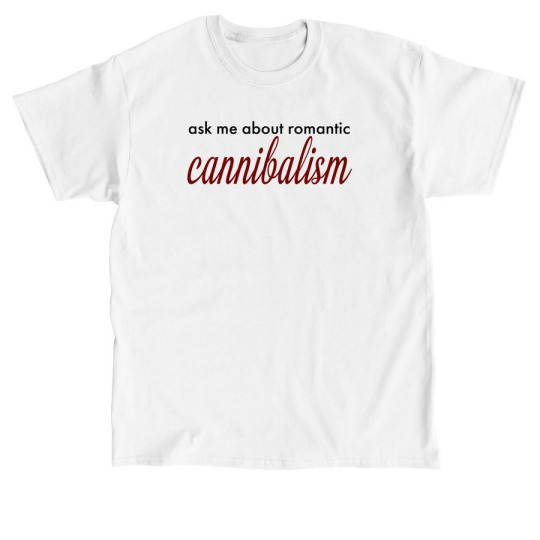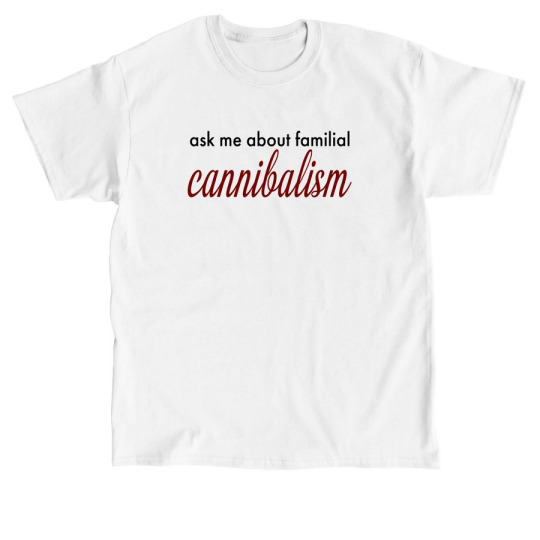exterrorist
72 posts
Don't wanna be here? Send us removal request.
Text

May Sarton, from “Contemplation of Poussin”, Letters from Maine
4K notes
·
View notes
Text

𓂃‿( ✙ ) ‿𓂃 Cariadore.
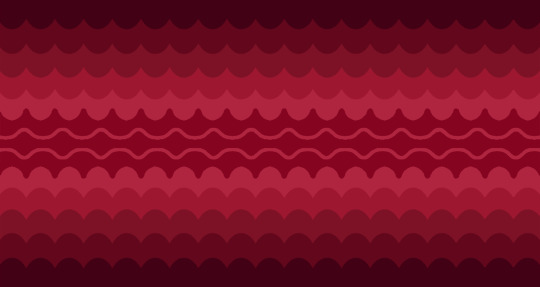


A gender related 02 cannibalism as a metaphor 04 love.PT Below the cut.

PT: Cariadore: A gender related to cannibalism as a metaphor for love.
848 notes
·
View notes
Text
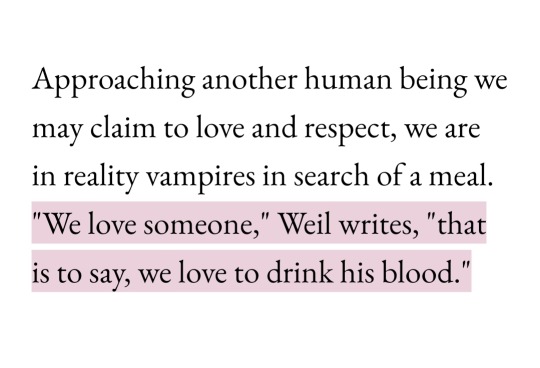
Alec Irwin, 'Devoured by God: Cannibalism, Mysticism, and Ethics in Simone Weil'
3K notes
·
View notes
Text

Lovers of Human Flesh: Homosexuality and Cannibalism in Melville’s Novels [Caleb Crain, American Literature, 1994]
398 notes
·
View notes
Text
“Cannibalism, the most elementary act of exploitation, that of turning the other directly into a comestible; of seeing the other in the most primitive terms of use.”
— Angela Carter, The Sadeian Woman: An Exercise in Cultural History
420 notes
·
View notes
Text
love ouroboros. cannibalization of the divine except you are the cannibal and the divine and the witness watching it
82K notes
·
View notes
Photo

Caroline Bynum, excerpt from Fragmentation and Redemption: Essays on Gender and the Human Body in Medieval Religion
2K notes
·
View notes
Text
“What are the butcherly delights of meat? These are not sensual but analytical. The satisfaction of scientific curiosity in dissection. A clinical pleasure in the precision with which the process of reducing the living, moving, vivid object to the dead status of the thing is accomplished. The pleasure of watching the spectacle of slaughter that derives from the knowledge one is dissociated from the spectacle; the bloody excitation of the audience in the abattoir, who watch the dramatic transformation act, from living flesh to dead meat, derives from the knowledge they are safe from the knife themselves. There is the technical pleasure of carving and the anticipatory pleasure of the prospect of eating the meat, of the assimilation of the dead stuff, after which it will be humanly transformed into flesh.”
— The Sadeian Woman & the Ideology of Pornography, Angela Carter (via dearorpheus)
265 notes
·
View notes
Text
“Food itself is an inherently liminal object because it transgresses the borderlines between the inside and the outside, the Self and the Other.”
— Michael Fuchs and Michael Phillips from “It’s Only Cannibalism if We’re Equals: Carnivorous Consumption and Liminality in Hannibal”; from the Quarterly Review of Film and Video: Vol 35, No 6. (via ligeia-of-the-rhine)
520 notes
·
View notes
Text
“And in Sanskrit there is a phrase, a phrase to carry with you wherever you go: sarvam annam: everything is food. Every last thing.”
— - Teddy Macker
226 notes
·
View notes
Text
To eat is to be implicated in a vast, complex, interweaving set of life and death dramas in which we are only one character among many. No matter how solitary our eating experience may be, every sniff, chomp, and swallow connects us to vast global trade networks and thus to biophysical and social worlds far beyond ourselves. The moment we chew on anything we participate in regional, geographic histories and in biochemical processes that, for all their diversity and complexity, defy our wildest imaginations and most thorough attempts at comprehension. The minute we contemplate or talk about eating, we show ourselves to be involved in culinary traditions and cultural taboos, as well as moral quandaries and spiritual quests. To amend an ecologist’s maxim: we can never only bite into one thing.
Norman Wirzba, Food and Faith: A Theology of Eating
454 notes
·
View notes
Text
in summer wounds fester and in winter they ache. another one of life's classic no win scenarios
14K notes
·
View notes
Text
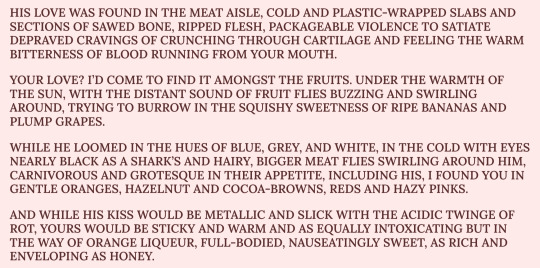
when you accidentally smell him for the first time
14 notes
·
View notes
